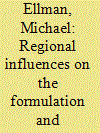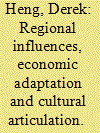|
|
|
Sort Order |
|
|
|
Items / Page
|
|
|
|
|
|
|
| Srl | Item |
| 1 |
ID:
133152


|
|
|
|
|
| Publication |
2014.
|
| Summary/Abstract |
Research on interstate mediation tends to assume (implicitly) that regional factors have little effect on the occurrence of mediation. We relax this assumption and advance an explicit regional theory of mediation in which regional ties create a type of bias that motivates both (potential) third parties to mediate conflicts within their region and disputants to select or accept these regional actors as mediators more frequently than non-regional actors. This bias first appears when states belong to the same region. In such situations, the potential third party and disputants likely understand one another better and share common security concerns. Yet regional membership does not explain the variation in mediation behavior within regions. To account for this, we argue that regionally more powerful states, as well as those that share (regional) institutional memberships with the disputants, have greater incentives to mediate than some regional counterparts. We empirically test the effect of these characteristics on the likelihood of mediation in militarized interstate disputes during the period 1946-2000. Our findings uncover support for our argument and suggest that accounting for regional bias is important in explaining mediation patterns in interstate conflict.
|
|
|
|
|
|
|
|
|
|
|
|
|
|
|
|
| 2 |
ID:
097760


|
|
|
|
|
| Publication |
2010.
|
| Summary/Abstract |
The article provides an analysis of the regional input into NKVD order 00447, the deadliest of the 1937-1938 state terror attacks on the Soviet population. This regional input concerned the decision to establish regional troikas, the choice of the target groups, the size of the initial limits, the extension of the deadline for completing the operation, the relationship between the initial limits and the final number of victims, the relationship between the final limits and the final number of victims, the actual victims, and unauthorised terror. It is argued that the formulation and implementation of order 00447 was a dynamic process of interaction between the centre and the regions in which the regions played a significant, but subordinate, role.
|
|
|
|
|
|
|
|
|
|
|
|
|
|
|
|
| 3 |
ID:
173378


|
|
|
|
|
| Summary/Abstract |
Studies on the international history of fourteenth-century Singapore have been hitherto limited to external trade conducted by local inhabitants, and material consumption patterns that this trade enabled them to develop. Broader regional cultural influences have been postulated though not clearly demonstrated, given scant textual records and limited material culture remains. This article seeks to examine the external influences, adaptation and assimilation in the production and consumption of fourteenth-century Singapore. In particular, it looks at three aspects of Singapore's pre-colonial existence — modes of economic production, patterns of consumption of international products, and the articulation of high culture vis-à-vis external entities. By examining available archaeological, epigraphic, art historical and cartographic data from the fourteenth through the nineteenth centuries, this article postulates how distinct consumption patterns may have developed among different riverside populations living north of the Singapore River. This study also questions the common view that Singapore developed as a cosmopolitan port-city only after the advent of British colonialism, demonstrating that its diversity and openness was likely a feature centuries before.
|
|
|
|
|
|
|
|
|
|
|
|
|
|
|
|
|
|
|
|
|